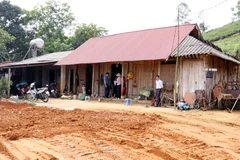Fifteen out of 29 districts in the city have a high rate of genderinequality, with 155 boys for every 100 girls born in the first threemonths this year. Last year the city's rate was 115 boys for every 100girls, according to statistics of the Hanoi Department of Health.
By the end of last month, the city had more than 18,600 new-bornbabies, an increase by 2,780 babies compared with the same period lastyear.
The number of families to have a third child hasalso increased during the first quarter this year. More than 1,400 outof 18,600 babies born during the first quarter were the third child, anincrease of 309 babies compared with the same period last year.
The number of third-child births is predicted to continue increasingthroughout the year, said Vu Thi Lien Huong, deputy director of theHanoi Department of Population and Family Planning.
Inthe Ordinance on Population issued in 2009, the State encouragedfamilies to only have one or two children in a bid to counter a possiblepopulation explosion that could lead to a shortage of land, naturalresources and jobs, said Huong.
Nguyen Thanh Quang, wholives in Tu Liem District and has two daughters and a boy who was bornat the beginning of this year, said he and his wife are determined tohave a son as a male will maintain the continuity of the family line.
"Moreover, a fortune teller said that we will be luckier and moreprosperous if we have a boy born this year - the year of dragon," hesaid.
However, not all families who have a third child expect to have a boy.
Nguyen Kim Thoa, an accountant, said she wants to have three children irrespective of if they are boys and girls.
Thoa has one boy and one girl, and gave birth to another girl last month.
"I am capable of bringing up one more baby, and I love to have many children," she said.
Vu Thi Lien Huong said most third children are born in suburbandistricts or districts in former Ha Tay Province, which merged intoHanoi in 2008.
Dissemination on family planning in thedistricts was still weak, thus residents in these areas are not awareof the consequences of gender inequality, said Huong.
Ifgender inequality among new-borns is not curbed, the city in particularand the country in general will face the risk of men not being able tofind wives, along with gender violence and human trafficking.
"I think that we should make prenatal gender selection a crime in theCriminal Law so that the punishment for this is strict enough," saidHuong.
In addition, dissemination of information aboutthe issue to couples of child-bearing age and medical workers should beimproved, she said.-VNA
























